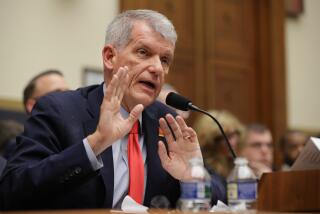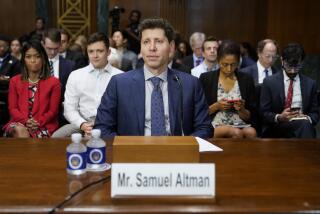Enron Chief Misled Employees, Waxman Says
- Share via
WASHINGTON — Key congressional investigators charged Saturday that Enron Corp. Chairman Kenneth L. Lay misled his 21,000 employees late last summer when he gave them a rosy picture of the company’s financial health, even as the giant energy conglomerate was sliding toward financial ruin.
Rep. Henry A. Waxman of Los Angeles, the ranking Democrat on the House Committee on Government Reform, released copies of e-mails sent by Lay to employees in August that suggested all was well with the company and that its stock would rebound.
But Waxman said Lay must have known then that Enron was falling into deep financial trouble.
The e-mails were sent as Enron shares tumbled in the wake of Jeffrey Skilling’s abrupt Aug. 14 resignation as company president.
“It appears that you misled your employees into believing that Enron was prospering and that its stock price would rise,” Waxman said in a letter to Lay, asking him to respond by Friday.
Repeated calls seeking comment from officials at Enron’s headquarters in Houston went unanswered Saturday. But Enron spokesman Mark Palmer told Associated Press that the company was on solid footing when Lay sent the e-mails and that its financial problems did not become clear until later.
“Ken Lay was telling the truth,” Palmer said. “We had had 21 consecutive quarters of earnings growth, the same number of consecutive quarters of volume growth. Our core business at Enron had never been in better shape.”
In an Aug. 14 e-mail, Lay told employees “that I have never felt better about the prospects for the company.”
Two weeks later, on Aug. 27, an e-mail advised employees that his work to shore up investor confidence in the company likely would “result in a significantly higher stock price.”
In other developments Saturday, two Republican House leaders, Reps. W.J. “Billy” Tauzin of Louisiana and James C. Greenwood of Pennsylvania, called on Enron accounting firm Andersen to turn over additional records to congressional investigators.
Late last week, the Chicago-based company disclosed that from September to November it had destroyed thousands of documents involving Enron Corp.
Tauzin and Greenwood asserted in a letter to Andersen that the documents were “knowingly destroyed” and said they did not want to risk the loss of any other paperwork. They gave the company until Monday to produce some documents and until Friday for others.
Andersen spokesman Patrick Dorton said, “We are committed to being forthright and doing the right thing in this matter.”
Also, the Center for Public Integrity, a Washington-based watchdog group that studies political fund-raising, said a review of federal disclosure forms shows that 14 of the Bush administration’s top 100 officials owned Enron stock. Based on the disclosure forms, in which officials provide an estimated range of their assets’ values, the Enron holdings by the administration officials were worth between $284,000 and $886,000.
Bush Officials Were Shareholders
Senior officials who owned stock included Defense Secretary Donald H. Rumsfeld; Karl Rove, President Bush’s chief political advisor; and Peter Fisher, an assistant Treasury secretary. It was disclosed Friday that a top Enron executive called Fisher several times in the fall asking him to help the company secure a bank loan. White House officials say Fisher did not intervene in the matter.
Lay has been a friend of Bush, and he and other Enron executives have contributed about $550,000 to the president’s political endeavors.
But Enron officials have been generous to Democrats as well, contributing to Al Gore, Bush’s opponent in the 2000 presidential campaign, and to more than half the 50 Democrats in the Senate.
Enron officials have acknowledged that, during the latter part of last year, they were desperately trying to save the company from the bankruptcy filing that occurred in December. As a result of the company’s collapse, thousands of families who owned Enron stock lost money.
Last week, new details emerged about company executives, including Lay, seeking help from Bush administration officials to stave off the company’s demise. Those contacted included Treasury Secretary Paul H. O’Neill and Commerce Secretary Don Evans; both have said they took no action to help Enron.
The e-mails offer a glimpse into the inside world of Enron at a time when its financial problems were growing but before company executives turned to O’Neill and Evans for help.
Though he cited personal reasons for leaving the company, Skilling’s departure Aug. 14 triggered a battering of Enron stock.
“I want to assure you that I have never felt better about the prospects for the company,” Lay’s e-mail read that day.
“All of you know that our stock price has suffered substantially over the last few months. One of my top priorities will be to restore a significant amount of the stock value we have lost as soon as possible.”
He added that “our performance has never been stronger; our business model has never been more robust; our growth has never been more certain.
“We have the finest organization in American business today.”
On Aug. 27, Lay sent another e-mail to employees, who received a grant of stock options, and told them that “one of my highest priorities is to restore investor confidence in Enron.”
He added that his efforts “should result in a significantly higher stock price.”
Waxman, in his letter to Lay about the e-mails, noted that, by the time of the second computer message, the stock price was at $37 a share, down from a high the previous August of $90.56.
“You had already sold $40 million of Enron stock during 2001 and over $100 million since October 1998,” Waxman told Lay.
Enron stock hit a low of 26 cents a share Nov. 30.
As Stock Fell, So Did Severance
Waxman further noted that, while the company stock was plummeting, Lay sought a $60-million severance package for himself. When employees objected, Waxman said, “you proposed reducing your package to $40 million.”
And when Enron employees again objected, Lay decided in mid-November not to accept the severance package compensation.
Waxman said he was bothered that Lay told his employees everything was fine, but less than two months later he was telling Bush officials in Washington that the company urgently needed help to prevent a bankruptcy filing.
“At a minimum,” Waxman said, the statements by Lay “create the appearance that you misled Enron employees about the value of their investments in Enron and the security of their jobs.
“If this were accurate, it would be a gross betrayal of your employees’ trust, as well as possibly illegal conduct.”
More to Read
Inside the business of entertainment
The Wide Shot brings you news, analysis and insights on everything from streaming wars to production — and what it all means for the future.
You may occasionally receive promotional content from the Los Angeles Times.











